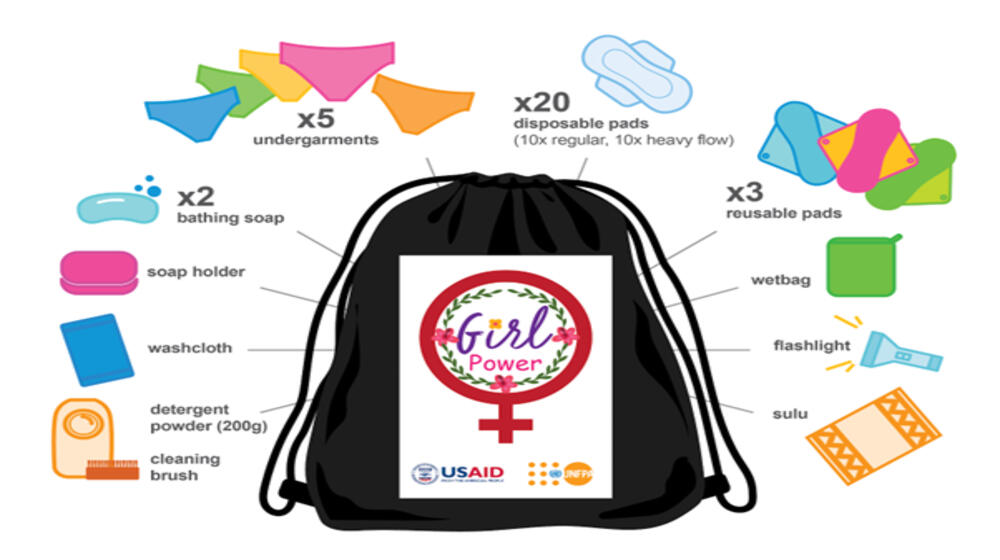Managing menstruation during emergencies is a challenge for most adolescent girls and women in the Pacific as they are opted to use old cloth, handkerchiefs,s or even old socks.
Vasiti Malomo Vakamalei is one of the 52 students who received the Menstruation Health Management kit (MHMK) on December 12th, 2021 during an outreach session conducted by the Midwife based at the Vuna Outreach Site at South Taveuni Secondary School.
During the post-distribution focus group discussion held at the South Taveuni Secondary School on the 1st of March, Vasiti mentioned how satisfied she was with the contents of the kit, she has been using a piece of cloth that was very thin to manage her menstruation before receiving the kit.
“Not only me but my family was also pleased to see the MHM kit, and when they saw the reusable pads, they were shocked because it was new for all of us and before we used to have a cloth just like a handkerchief as a reusable pad,"said Vasiti.
Vasiti said that finding pads, especially reusable pads in her village is tough, “I never saw anywhere they are selling (that sells) reusable pads in Taveuni, they only sell disposable pads, and I never used that kind of pad because when I use disposable pads, it blocks my menstruation and I get stomach-ache”.(editor’s disclaimer: this is a personal opinion of the interviewee, not a scientifically proven fact.)
At any given emergency, an estimated 25% of the affected population are women of reproductive age including adolescent girls (10-19 years old). In Fiji, there were 6634 girls aging between 15 to 19, affected by the most recent severe cyclone TC Yasa. Populations affected by natural disasters face many challenges and access to sanitary items that allow women and girls to manage menstrual hygiene safely effectively, and with dignity is one of them. UNFPA Pacific (United Nations Populations Fund) adopted the global standard of Menstrual Hygiene Kit to the Pacific context through research and community consultations in April 2021. The kit was designed to supplement the existing Pacific customized Dignity Kit and Women with Disability Dignity Kits, providing culturally appropriate menstrual hygiene supplies for at least 3 months and relevant.
Stella Wainikarawa is a 34-year-old woman from Nagigi village, Savusavu who has down syndrome and mobility challenges.
Stella has had mobility challenges since she was 16 years old and has found it challenging to use disposable sanitary napkins. Stella's mother Nemai, commented that “I was not able to buy pads for her (Stella), so I had to sew napkins to make it thick enough to absorb blood and put it on Stella to use during her menstruation. She was always complaining about the napkins as it was not comfortable and was very thick”, said Nemai.
When asked about what she likes in the MHM kit Stella said she liked that the "Reusable pads stay longer and are more comfortable”.
Nemai appreciated the kits given to Stella by one of the community workers, Rejieli Wainikarawa. “I thank UNFPA Pacific for the things I got for my daughter, finally she is using comfortable pads and the things which help her to maintain her hygiene.”
Stella's story highlights how important it is for women with disability voices to be included in kit distributions.
The Pacific customized Menstrual Hygiene Management (MHM) kits were piloted in Fiji as part of the response to TC Ana and TC Yasa to support adolescent girls (10-19 years) in the affected areas. Through the Women Friendly Spaces (WFS) and outreach services programme retired midwives and youth advocates distributed the MHM kits while also providing essential health information and awareness.
As part of UNFPA Pacific’s commitment to accountability to affected populations, a post MHM kit distribution evaluation was conducted, to understand how we can do even better. This makes the office (UNFPA Pacific) the first in the Pacific to run a post-MHM kit distribution evaluation.
The midwives, youth advocates, and the community health workers at the Women Friendly Spaces and outreach sites were instrumental in the distribution of the kits, providing informative menstrual hygiene sessions to the adolescent girls before receiving the kit.
A total number of 2,994 MHM kits were distributed to adolescent girls of Vanua Levu last year as a part of UNFPA Pacific’s TC Yasa Response. Thanks to the brave girls, midwives, and community health workers that were part of developing the kit, the same MHM Kit is also deployed to girls in Tonga. However, UNFPA Pacific’s mission to provide culturally appropriate, essential menstrual management items to adolescent girls affected by disasters does not end here. The humanitarian team will take the findings from the discussions and interviews and improve the kit, to ensure more girls in Fiji and the Pacific manage their menstruation with dignity even after the cyclone has passed and under COVID-19 lockdowns.


